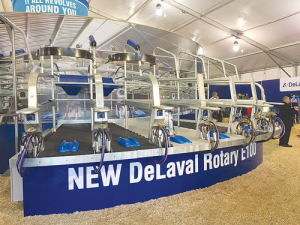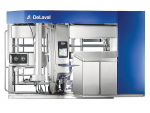Rotary milking machines are becoming more popular worldwide, says DeLaval executive vice-president milking systems Jonas Hallman.
External rotaries, where the operator stands outside the milking platform, sell well in New Zealand.
“We also sell internal rotaries but that’s mainly in Europe. NZ has always been a big market for rotary systems; it seems to be the preferred way of milking cows here,” Hallman told Dairy News.
He was made these comments at the unveiling of the new DeLaval Rotary E100 at Fieldays in Hamilton.
The DeLaval Rotary E100, designed and built by engineers in Hamilton, is the result of a multi million dollar development process to create the ultimate rotary for NZ farming conditions.
Hallman says this new DeLaval Rotary is designed to meet the needs of NZ farmers; it is not a ‘global compromise’ for the NZ dairy industry.
Despite the dairy price slump of the last three years, DeLaval had key members of its global engineering team based at its Hamilton hub, working on the new system.
“Our company is long-term oriented; during downturn years and tough times it’s good to invest in R&D so that when the economy improves we can go to the market with new products that hopefully bring value to our customers.
“Not often do we launch a new system platform so we are excited about the DeLaval Rotary E100… and looking at our customers’ faces we could see they liked what they saw.”
Hallman says the new rotary has been designed after input from farmers, with improved features from previous platforms.
The new system will initially be aimed at pasture-based dairying in NZ, Australia and Europe. Different versions will be manufactured for barn-based farms in Europe, and a heavier version for mega farms in the US and China.
Until the Fieldays, the DeLaval Rotary E100 was under wraps on a test farm in Tirau where a 500-cow herd was the first to put the system through its paces over the 2016-17 season.


















